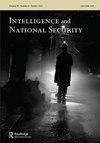整合日本情报界:分析内阁情报总监作为协调机构的有效性
IF 0.8
3区 社会学
Q1 HISTORY
引用次数: 0
摘要
本文章由计算机程序翻译,如有差异,请以英文原文为准。
Integrating Japan’s Intelligence Community: analyzing the effectiveness of the Director of Cabinet Intelligence as a coordinating body
ABSTRACT This study aims to determine the level of integration of Japan’s Intelligence Community (IC), particularly the effectiveness of the Director of Cabinet Intelligence (DCI) as a coordinating body, since the Japanese government started its IC reform in 2008. A quantitative analysis of the relationship between the Prime Minister, the DCI, and other actors reveals that the DCI has progressed in IC integration since 2008. The findings have significant implications for the future development of Japan’s IC, particularly in terms of the evolving role of the DCI as a community facilitator rather than a personal briefer to the Prime Minister.
求助全文
通过发布文献求助,成功后即可免费获取论文全文。
去求助
来源期刊

Intelligence and National Security
Multiple-
CiteScore
1.80
自引率
41.70%
发文量
93
期刊介绍:
Intelligence has never played a more prominent role in international politics than it does now in the early years of the twenty-first century. National intelligence services are larger than ever, and they are more transparent in their activities in the policy making of democratic nations. Intelligence and National Security is widely regarded as the world''s leading scholarly journal focused on the role of intelligence and secretive agencies in international relations. It examines this aspect of national security from a variety of perspectives and academic disciplines, with insightful articles research and written by leading experts based around the globe. Among the topics covered in the journal are: • the historical development of intelligence agencies • representations of intelligence in popular culture • public understandings and expectations related to intelligence • intelligence and ethics • intelligence collection and analysis • covert action and counterintelligence • privacy and intelligence accountability • the outsourcing of intelligence operations • the role of politics in intelligence activities • international intelligence cooperation and burden-sharing • the relationships among intelligence agencies, military organizations, and civilian policy departments. Authors for Intelligence and National Security come from a range of disciplines, including international affairs, history, sociology, political science, law, anthropology, philosophy, medicine, statistics, psychology, bio-sciences, and mathematics. These perspectives are regularly augmented by research submitted from current and former intelligence practitioners in several different nations. Each issue features a rich menu of articles about the uses (and occasional misuses) of intelligence, supplemented from time to time with special forums on current intelligence issues and interviews with leading intelligence officials.
 求助内容:
求助内容: 应助结果提醒方式:
应助结果提醒方式:


